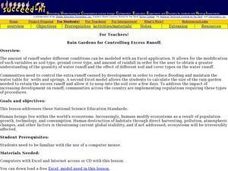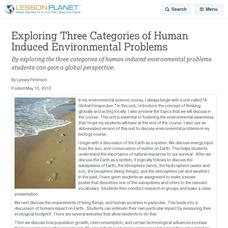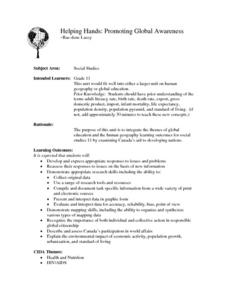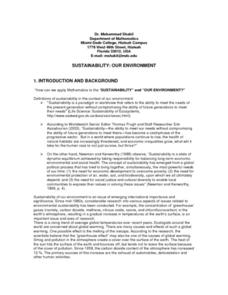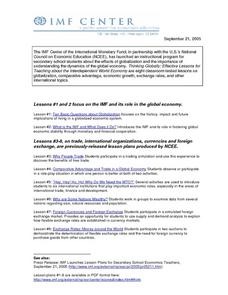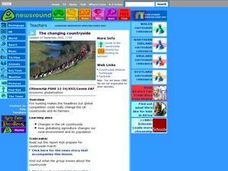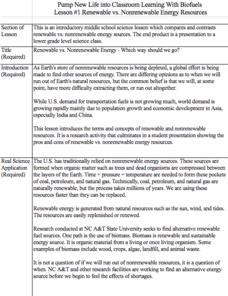Curated OER
Rain Gardens for Controlling Excess Runoff
Pupils address the idea that human beings live within the world' ecosystems. They discuss how humans modify ecosystems as a result of population growth, technology, and consumption. Students discuss how the human destruction of habitats...
Curated OER
Endangered Species !: Why Are Species Endangered?
Young scholars explore the various issues and problems faced by endangered species globally. They research the plight of endangered species, create a poster of a selected animal, and present their poster and research to the class.
Curated OER
The Impacts of Human Activities on Biodiversity in New Haven County
Students discover how plants and animal ecosystems are affected by the growth of a city. In this ecology lesson, students study and observe a plant over a period of time. They develop a creative presentation of their data and share them...
Curated OER
Exploring Three Categories of Human Induced Environmental Problems
By exploring the three categories of human-induced environmental problems students can gain a global perspective.
Curated OER
How Much Is There To Eat?
Tenth graders compare the relationship of food production and population in India with the southern regions of the United States.
Curated OER
Field Of Beans
Students investigate the concept of crop farming. They plant small fields to test different theories of agriculture. Students keep care over the fields, including pest and weed control. Students make and record daily observations to...
Curated OER
Australia and Argentina: A Study in Contrast
Students study world events and their effect on economic growth. They research and interpret graphs to determine explanations for economic growth. Students compare the World Wars and the Great Depression to the growth of Argentina and...
Curated OER
Health, Pollution, and Safety: Why Should We Care?
Students examine the impact of reducing the carbon dioxide emissions. They identify ways alternative fuels can lessen the effect of emissions on communities. Working in teams they conduct research from various community and Internet...
Curated OER
Endangered Species 1: Why Are Species Endangered?
Young scholars are oriented to the plight of endangered species and to help them explain and gain perspective on human issues that continue to endanger species and threaten our global environment.
Curated OER
Arsenic Globally
Learners, using directed questions, identify five internet resources. They use these resources to identify relevant information by highlighting those sections that address the provided questions. Students present the answers to these...
Curated OER
Helping Hands: Promoting Gloval Awareness
Eleventh graders explore Canadian support for foreign aide. In groups, 11th graders discuss Canadian aide policies and express their opinion of each. Students brainstorm methods of contributing to developing nations. They complete...
Curated OER
Banana Republics - United Fruit Co.
Students define multinational companies and describe their roles as key economic developers in developing countries, determine whether trade-off between surrendering control of a country's economy to foreign companies and economic...
Curated OER
Sustainability: Our Environment
Young scholars explore the sustainability of our environment, the trend in rising temperatures and the emission of greenhouse cases. Using given data, students test and construct a confidence interval and the difference between two...
Curated OER
Flowering Phenology: How Do Plants Know When to Flower?
Students study the process of plant reproduction and the biotic and abiotic factors that affect flowering phenology. In this plant reproduction lesson, students describe the interaction of environmental factors as it relates to...
PricewaterhouseCoopers
Conservation: Water
Here is a fantastic experiment-based lesson on water conservation, waste, and filtration. The lesson plan is well-developed and provides background information, discussion leads, and six scripted lab activities anyone can do. The class...
PricewaterhouseCoopers
Waste and Recycling: Recycling Paper
We take paper for granted, while thousands of trees are being made into the paper we toss in the trash. Start a dialogue about paper reduction and recycling in class, and share the negative effects paper production has on our ecosystem....
Curated OER
Hey, Hey! Ho, Ho! Why Do We Need the WTO?
Students participate in various hand-on activities as they study six international institutions that play important economic roles in the areas of international trade and finance.
Curated OER
Why Are Some Nations Wealthy?
Students, in groups, examine data from several nations regarding size, natural resources, and population. Using these data, they rank the nations, try to identify them, and predict whether each nation is rich or poor.
Curated OER
The Changing countryside
Students draw a poster showing the costs and benefits of opening up Britain's farmers to the global marketplace. They use a piece of A4 or A3 paper in landscape. Students draw a vertical line to split the page in two. On the left...
Curated OER
Islam in America
Students examine the cultural and religious diversity within the United States. Using the differences, they discover they are a source of growth and change as well as conflict. They identify the changes that occur when new immigrants...
Curated OER
Tools of the Trade: The Use of Geographic Tools
Students examine the tools of demographic analysis and apply them to real-world situations. They analyze maps, define terminology, and write an information paper for the appropriate government agency to recommend an action or policy change.
Curated OER
Geomnemonics: Facilitating the Teaching of Social Studies Content with Geography Skills
Students explore how to draw a world map by hand and how to locate countries.
Curated OER
Getting it Straight with Latitude and Longitude Skills
Teachers can help students learn latitude and longitude skills using games and other motivating activities.
Kenan Fellows
Renewable vs. Nonrenewable Energy Resources
Is one type of energy inherently good or bad? Young scientists explore energy resources in a week-long unit. After extensive research, groups create powerful position statements and presentations supporting their energy resource of choice.


